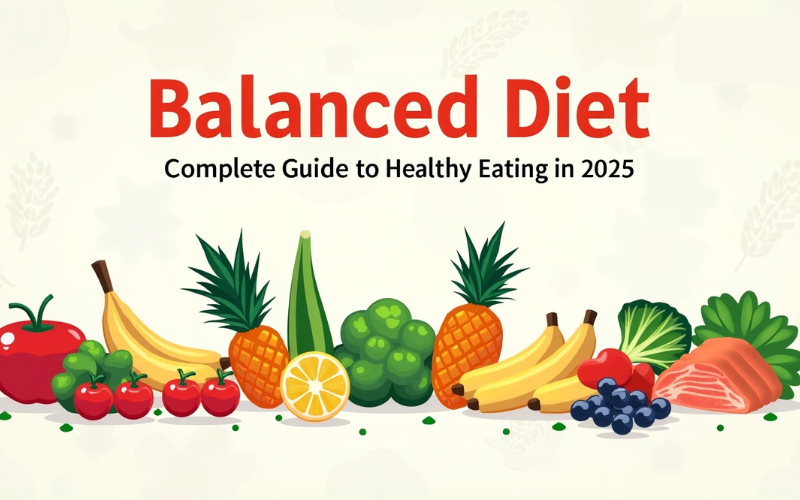No products in the cart.
Return To ShopBalanced Diet: Complete Guide to Healthy Eating in 2025
In today’s fast-paced lifestyle, maintaining a balanced diet is essential for overall health and wellbeing. A balanced diet provides your body with the right amount of nutrients, vitamins, and minerals to function effectively. This guide will help you understand what a balanced diet is, its benefits, and practical tips to incorporate it into your daily life.
What is a Balanced Diet?
A balanced diet refers to eating a variety of foods in the right proportions to maintain health, energy, and vitality. It includes essential food groups such as fruits, vegetables, proteins, whole grains, dairy, and healthy fats while limiting sugar, salt, and processed foods.
According to the NHS Eatwell Guide, a balanced diet should be based on:
- At least 5 portions of fruits and vegetables daily.
- Starchy carbohydrates (whole grains preferred) as a major energy source.
- Moderate amounts of protein-rich foods.
- Low-fat dairy or alternatives.
- Minimal intake of saturated fats, sugars, and salt.
- Plenty of water to stay hydrated.
Key Food Groups in a Balanced Diet

Fruits and Vegetables
Aim for a colorful variety of fruits and vegetables. They are rich in fiber, vitamins (like vitamin C and A), and antioxidants that protect against chronic diseases.
Whole Grains and Starchy Carbohydrates
Choose wholemeal bread, brown rice, oats, and other high-fiber carbohydrates for long-lasting energy and digestive health.
Protein Sources
Include a variety of proteins like lean meats, fish, eggs, pulses (lentils, beans), and plant-based proteins to support muscle repair and immune function.
Dairy and Alternatives
Opt for low-fat milk, yogurt, or fortified plant-based alternatives to get enough calcium and vitamin D for bone health.
Healthy Fats
Healthy fats from sources like olive oil, avocados, nuts, and seeds support heart health and nutrient absorption.
Water and Hydration
Water is essential for every bodily function. Aim for at least 6-8 glasses of water daily. Limit sugary drinks and excessive caffeine.
How to Plan a Balanced Meal
Planning a balanced meal becomes simple when you follow the “Plate Method”:
- ½ of your plate with vegetables and fruits.
- ¼ with whole grains or starchy carbohydrates.
- ¼ with proteins.
- Include a serving of dairy or alternative.
- Drink water with every meal.
Reading Food Labels
Understanding nutrition labels helps you choose healthier options. Focus on serving sizes, sugar content, salt levels, and the amount of saturated fats.
Meal Planning Tips
- Prepare a weekly meal plan.
- Shop with a grocery list to avoid impulse buys.
- Cook at home using fresh ingredients.
- Batch-cook meals for busy weekdays.
Benefits of Eating a Balanced Diet
Eating a balanced diet offers numerous health benefits, such as:
- Weight Management: Helps maintain a healthy weight naturally.
- Heart Health: Reduces cholesterol and blood pressure.
- Stronger Immunity: Provides essential nutrients that support the immune system.
- Improved Digestion: High-fiber foods promote gut health.
- Mental Clarity and Focus: Balanced meals stabilize blood sugar levels, enhancing concentration and reducing fatigue.
Balanced Diet for Different Age Groups

Children and Teenagers
Growing bodies require more nutrients. Ensure adequate calcium, iron, and protein intake to support development.
Adults and Seniors
Older adults need to focus on nutrient-dense foods with fewer calories, such as fruits, vegetables, and lean proteins, to maintain muscle mass and bone health.
Special Diet Considerations
Vegetarians and vegans should ensure adequate intake of plant-based proteins, iron, vitamin B12, and omega-3 fatty acids. Diabetics must monitor carbohydrate portions and opt for low-glycemic foods.
How to Reduce Salt, Sugar, and Saturated Fat
- Choose unsalted nuts and seeds.
- Swap sugary drinks with water or herbal teas.
- Opt for lean cuts of meat and grill instead of frying.
- Check for “low-salt” or “no-added-sugar” labels when shopping.
- Limit processed snacks and prefer homemade alternatives.
Do You Need Supplements with a Balanced Diet?
Most people can meet their nutritional needs through food. However, supplements may be necessary for individuals with:
- Specific deficiencies (e.g., Vitamin D, Iron, B12)
- Pregnant women needing folic acid.
- Older adults with calcium or vitamin D requirements.
Always consult a healthcare provider before starting any supplement regimen.
8 Practical Tips to Maintain a Balanced Diet in 2025
- Shop Smartly: Plan your grocery list based on healthy meal plans.
- Cook More at Home: Control ingredients and portion sizes.
- Prepare Healthy Snacks: Keep fruits, nuts, and yogurt ready.
- Stay Hydrated: Carry a water bottle and track your intake.
- Practice Mindful Eating: Avoid distractions while eating.
- Portion Control: Use smaller plates to avoid overeating.
- Be Consistent: Small, sustainable changes work better than crash diets.
- Stay Informed: Follow evidence-based nutrition sources, avoiding diet myths.
Frequently Asked Questions (FAQs)
1. What is a balanced diet in simple words?
A balanced diet includes a variety of foods from all major food groups in the right proportions to support health, energy, and wellbeing.
2. Why is a balanced diet important?
It ensures your body gets essential nutrients, helps maintain a healthy weight, boosts immunity, and reduces the risk of chronic diseases.
3. Can I lose weight with a balanced diet?
Yes, following a balanced diet with portion control and regular activity supports natural weight loss.
4. How much water should I drink daily?
Aim for 6-8 glasses of water a day. Hydration needs may increase with physical activity or hot weather.
5. What are good examples of healthy fats?
Final Thoughts: Small Steps Towards a Healthier You
Adopting a balanced diet is not about perfection but about making small, consistent choices every day. Start by adding more fruits, vegetables, and whole grains to your meals and reducing processed foods. With a thoughtful approach, you can nourish your body and improve your overall health in 2025.
Fuel your healthy lifestyle with premium supplements at SportsOne.com.pk because balance begins with better choices.









Add comment